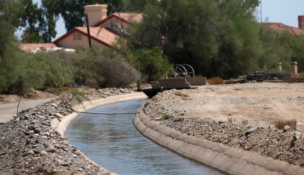Lawsuit challenges denial of bail for illegal immigrants
Arizona Capitol Reports Staff//April 11, 2008//[read_meter]
Lawsuit challenges denial of bail for illegal immigrants
Arizona Capitol Reports Staff//April 11, 2008//[read_meter]
A lawsuit filed by the American Civil Liberties Union and the Mexican American Legal Defense and Education Fund has challenged the Arizona law that denies bail to illegal immigrants accused of serious crimes.
Kristina Campbell, an attorney for MALDEF, said a blanket denial of bail is unconstitutional. The U.S. Constitution offers specific protections to all people accused of a crime, regardless of whether they are legal citizens or not, she said.
“We’re not asking for anyone to be released,” she said. “We’re asking for individual bond hearings.”
In the complaint, the plaintiffs argue that the Prop 100 laws violate the due-process clause of the 14th Amendment, the excessive bail clause of the Eight Amendment, the Fifth Amendment and the Sixth Amendment right to counsel.
The laws should be struck under the Supremacy Clause because they are inconsistent with federal immigration law, infringing on the federal government’s authority in the matter, the groups noted in the complaint.
Maricopa County Sheriff Joe Arpaio, Country Attorney Andrew Thomas and Superior Court Presiding Judge Barbara Rodriguez Mundell were named as defendants in the lawsuit.
Thomas said ACLU and MALFED are “up to their old tricks to shut us down.”
Roughly 78 percent of voters approved Prop. 100 in 2006 — the largest margin of any measure passed that year, Thomas said.
“The will of the people will be upheld,” Thomas said.
Prop 100 was needed because people who live in the country illegally are a flight risk, he said.
There are several examples of suspected criminals who have fled the country only to come back later and commit other crimes, Thomas said. He pointed out a case in which an illegal immigrant shot and killed Phoenix Police Officer Marc Atkinson in 1999.
Contrary to the arguments made by ACLU and MALDEF, Thomas said the Prop.100 laws do not overstep the Constitution because all accused criminals are given a chance to prove they’re in the country legally.
Thomas said the denial of bail for illegal immigrants puts Arizona on a track to correct a big problem.
“This is a modest step in the right direction,” he said.
But Robert McWhirter, a member of Arizona Attorneys for Criminal Justice, said he thinks the lawsuit is well-founded. Perhaps the biggest area of contention with the laws is the way the term “serious offenses” is defined, he said.
When the voters approved the proposition, he said, they were thinking the term would apply to crimes like homicide, aggravated assault and serious sex crimes.
But state law defines the serious offenses as any class 1-4 felony, which includes forgery and marijuana possession, he said.
“I don’t think people understood that Thomas and (Rep.) Russell Pearce and all their friends were going to make something as simple as a forgery a non-bondage offense,” he said. “That’s fiscally irresponsible. It costs a lot to hold someone in jail.”
Crime classification aside, McWhirter said the Legislature has lowered standard of proof of citizenship, which leads largely to racial profiling.
The law calls for only “probable cause of alienage,” McWhirter said, though even some U.S. citizens would have a hard time proving their citizenship.
Further, the Prop 100 laws, along with other immigration laws like those that came from Prop 300 overstep federal law, McWhirter said.
A spokesman from the Maricopa Country Sheriff’s office told the Associated Press he wondered why the sheriff would even be named since he doesn't set bail or make laws.
Dan Pochoda, legal director of ACLU of Arizona, said the lawsuit targets the heads of Arizona’s three branches of law-enforcement, including Arpaio, whose office checks immigration status for prosecution.
Thomas questioned why the lawsuit targets only Maricopa County, a reason Pochoda said is purely logistical.
The resources to properly litigate a suit like this would be hard to obtain if the claim were against the entire state.
“We don’t believe that it’s more unconstitutional in Maricopa than it is in Pima,” he said. But if the Prop. 100 laws were struck as a result of the case, other counties would follow suit.
The request of the lawsuit is not for damages, Pochoda said, only for a repeal of the laws.
The groups ask that “all defendants in the Maricopa jail system …be allowed at least the possibility of bail before a neutral judicial officer,” he said.
Previous laws held all accused criminals to the same standards, Pochoda said. Prop. 100 introduced an arbitrary set of rules, he said.
“It’s a change that denies fundamental rights,” he said. “(We’re) not saying these people should be treated better than others.”
















